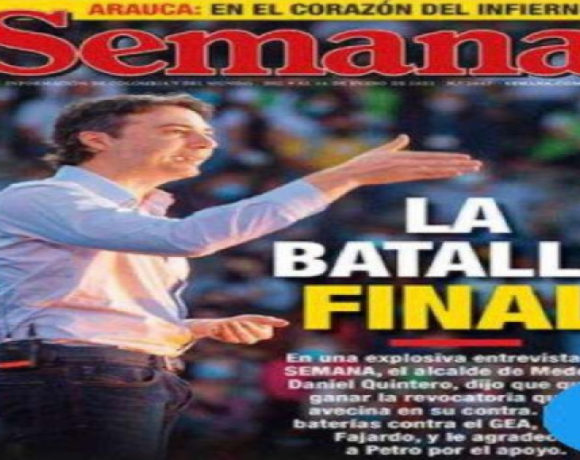Colombia Voters Pick Moderate for Presidential Candidate, Soundly Reject Socialism

In an unprecedentedly massive primary turnout, Colombia’s voters on March 11 chose moderate presidential candidate Ivan Duque of the center-right Centro Democratico party to face-off against socialist-populist Gustavo Petro in this spring’s presidential elections.
As the polls closed, the soft-speaking, diplomatic Duque publicly announced that he has chosen moderate Conservative Party candidate Marta Lucia Ramirez – the runner-up in the center-right primary contest yesterday — as his vice-presidential candidate.
In his post-election speech, Duque promised that if elected, he would reach across the broad political spectrum of Colombian politics to guide his administration’s policies. However, Duque added that he would fight any attempts by communists and populists to impose a Venezuelan-style dictatorship in Colombia.
“Our proposal is to include all Colombians, without exclusions,” Duque said. “The time has come to turn the page on impunity, clientelism, tax asphyxiation, distrust of institutions. We do not want to succumb to the temptations of populist authoritarianism in Venezuela, which has ruined Venezuela and has delivered the crudest kind of socialist reaction, whose reality is bread for today, hunger for tomorrow.”
In contrast, Petro’s venomous, conspiracy-filled post-election speech insulted Duque, Ramirez and their mostly moderate allies, terming them “the extreme right.”
Many Colombians fed-up with the murderous violence of nearly 60 years of communist and narco-terrorism – over the last 20 years tacitly or overtly supported by members of Venezuela’s socialist dictatorship — have protested at Petro’s populist-socialist campaign rallies, some of which have featured hundreds of bussed-in supporters aiming to create the illusion of majority support for Petro.
In his post-election speech, Petro denounced these protests against his socialist-populist campaign as a “conspiracy” which fails to provide “guarantees” for his candidacy.
In contrast to Petro’s venom, the ever-polite, calm-but-firm Ramirez — a veteran Colombian politician – modestly and warmly welcomed Duque’s primary victory. Ramirez would become Colombia’s first female vice-president if she is elected this spring.
The Duque/Ramirez ticket — uniting Conservatives and Centro Democratico – is now seen by many political analysts as likely to win either in the first or second round of Colombia’s presidential elections this spring, facing Petro and four other less-popular presidential candidates.
Duque and Ramirez collectively won twice as many votes as Petro in the Sunday primaries — a strong indication of Colombian voter intentions.
Voter sentiment here in favor of moderate-conservative candidates is partly a reaction to the horrors of the economic collapse of the socialist dictatorship in neighboring Venezuela, as well as voter anger over what many see as current President Juan Manuel Santos’ betrayal of former President Alvaro Uribe’s anti-terrorism policies and Uribe’s relative economic-policy successes.
Meanwhile, socialist-populist candidate Petro – a former Bogota mayor that left a legacy of administrative chaos and divisive, political venom — has been an apologist for the totalitarian Venezuelan government, issuing statements that have attempted to discredit independent news reports on the devasting impact of the Chavista regime on the majority of Venezuelans.
Also in Sunday’s voting, former president Alvaro Uribe won reelection in the national Senate races — getting far more votes than any other Senate candidate – while Uribe’s center-right Centro Democratico party gained 13 more seats in the House but dropped one seat in the Senate.
However, in Colombian congressional politics, party ideology typically plays a lesser role in policymaking, as Senators and Congress members of most parties typically form partial alliances with whomever becomes the next President.
Hence a Duque/Ramirez administration – which campaigned on a platform critical of the generous “peace” deal negotiated with the communist FARC by outgoing President Juan Manuel Santos — likely will be less generous in clarifying or confirming some still-unclear deal terms — either with the current FARC political leaders or the politically similar ELN terrorist group.
Many members of the new Congress — from various parties – are now seen by analysts as likely to work cooperatively with a Duque/Ramirez administration, as is typical of Colombian politics.
Following the President Santos “peace” deal, which guarantees the FARC 10 seats in the House and Senate — even without them having to win any popular vote — the FARC subsequently formed a political party, using the same FARC initials. In yesterday’s elections, the FARC gathered a paltry 85,000 popular votes — out of more than 15 million votes cast.
It’s yet another sign of Colombian voters’ overwhelming disgust with the communist FARC — and also a back-handed slap-in-the-face to President Santos, who went ahead with the “peace” deal despite a public plebiscite that voted to reject the deal.
















